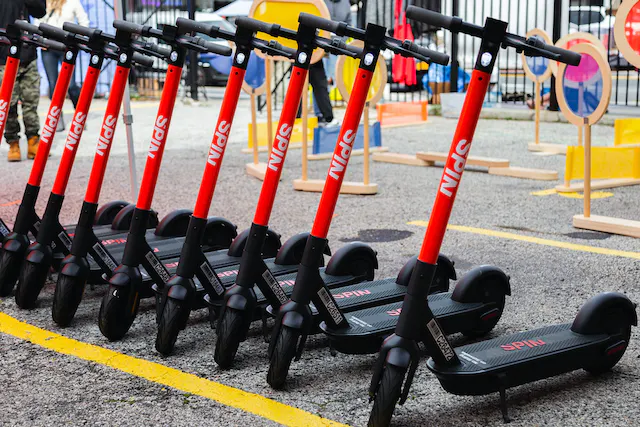
Ford is selling its electric scooter operation Spin to one of Europe’s top shared mobility companies. Tier Mobility will take over all of Spin’s operations, marking the first time the Berlin-based scooter company will have a foothold in North America. The companies declined to disclose the sale price, though the CEO of Tier said it was an all-stock deal.
Spin first launched in March 2017 in Seattle after working with the city to create a policy framework for regulating dockless bikes. The founder, Euwyn Poon, was inspired to create a dockless bike company after visiting Beijing and seeing the growing interest in micromobility services in that city. The company soon pivoted to electric scooters after Bird’s success in Southern California.
A year later, at the height of the scooter boom, Ford acquired Spin for $100 million, reportedly at the direction of former Ford CEO Jim Hackett, who was interested in branching out into new forms of mobility.
But as the automaker ramped up its investment in electric and autonomous vehicles, there was less and less room for expensive side projects. The company’s microtransit subsidiary Chariot shut down in 2019. And Argo AI, the autonomous vehicle startup backed by Ford and Volkswagen, is said to be considering a public offering. Ford mulled divesting itself from Spin for nearly a year, going so far as to hire an outside advisor to consider its options, including the possibility of merging Spin with a special acquisition company.
The news also comes a month after Spin laid off nearly a quarter of its staff amid a major restructuring that saw it pulling out of nearly every “open permit city” — cities that don’t restrict the number of scooter operators via a permitting system. That included several US cities, as well as European countries like Germany, Portugal, and Spain.
Meanwhile, Tier Mobility has been expanding its European footprint, recently acquiring Vento Mobility, the Italian subsidiary of Wind Mobility, and announcing a $200 million fundraising round for a total valuation of $2 billion. Tier was founded in 2018 and operates 250,000 vehicles — including electric scooters, bikes, and mopeds — in over 180 cities across 19 countries in Europe and the Middle East. It competes with Bird, Lime, Voi, Dott, and Wind, as well as some smaller companies.
Ben Bear, who assumed the role of CEO of Spin in June 2021, described the acquisition as a logical move that will enable the company to move up the ranks. “When I took over as CEO, the goal that they set for me was to find a way to be a top-two global player in micromobility,” he said, describing his conversations with Ford. “And as we explored the options, combination with Tier emerged is by far the best possible path to doing that.”
In a statement, Franck Louis-Victor, Ford’s vice president of new business, touted the “incredible synergies” between Spin and Tier and celebrated a “new era” for the combined scooter companies that will “provide scale that’s desperately needed in the competitive micro-mobility sector.” He also noted that Ford will remain a “strategic investor” in Tier.
Even though it has proven popular with riders, scooter sharing’s early years were marked by steep losses. The industry struggled to fix its unit economics, in which the purchase price for each scooter exceeded the amount of revenue it brought in before eventually breaking down. Most companies relied on a hefty dose of venture capital to keep their operations afloat.
The original scooters deployed by companies like Bird, Lime, and Spin — mostly sourced from Chinese companies like Xiaomi and Segway-Ninebot — weren’t built for shared use, so they were prone to breakdowns, often within weeks of being rolled out. But over the last several years, the scooter companies have taken pains to roll out better, more durable scooters in order to increase the average life span and improve their unit economics.
Bear noted that Spin has taken pains to improve its financial situation over the years, including a 50 percent improvement in unit economics and a profitable 12 months on an adjusted basis.
“What this combination really gives us is a path to global leadership that really didn’t exist as a standalone entity,” he said. “This is what Tier does, and with SoftBank’s backing, they’re in a position to play a really long game and win the market, which we’re excited about.”
Tier CEO Lawrence Leuschner said the company plans on maintaining the Spin brand in North America and doesn’t plan on making any additional layoffs at the company. Tier also plans on converting Spin’s scooter fleet to run on its swappable battery technology. Spin’s flagship scooter, the S-100T, which was first introduced last year, is the company’s first to feature a swappable battery.
“My impression was that the Ford people are super smart, and they really believe in micromobility,” Leuschner told The Verge. “But I think we run this business in like 400 cities, so there’s much more overlap in day-to-day operations but also technical stuff and [key performance indicators]. We can actually benchmark each other: How good is your operation? How’s the scooter performing here? How’s the scooter performing there? So I think we will have much more synergies that we can leverage and make the business better.”
Leuschner said he agrees with Spin’s strategy of pulling out of open permit cities and focusing on markets that limit competition. “I think the overall market, not only in the US but globally, goes to a licensed model, where the city is going to choose their two or three players,” he said. “That’s going to be the future.”